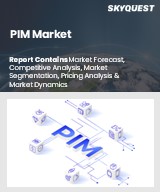
Report ID: SQMIG45F2202
Skyquest Technology's expert advisors have carried out comprehensive research on the pim market to identify the major global and regional market trends and growth opportunities for leading players and new entrants in this market. The analysis is based on in-depth primary and secondary research to understand the major market drivers and restraints shaping the future development and growth of the industry.
Raising Awareness of Product Transparency and Data Quality
Accelerated Growth of E-commerce and Omnichannel Retailing
Limitation of Skilled Professionals in Data and IT Systems
Data Governance Complexities and Integration Barriers
REQUEST FOR SAMPLE
Global PIM Market size was valued at USD 12.3 billion in 2023 and is poised to grow from USD 14.53 billion in 2024 to USD 54.97 billion by 2032, growing at a CAGR of 18.1% during the forecast period (2025-2032).
Market leaders are concentrating on automation, decision-making based on facts, and platform-based innovation in order to compete in the PIM space. Main strategies include the integration of AI and machine learning for enrichment of data, content syndication, and tailored customer support. Cloud-native solutions are the priority based on scalability as well as quick go-live capability. Mergers and acquisitions, and strategic partnerships are also increasing with organizations seeking global long-term coverage and vertical-specialized capacity. 'Oracle (USA)', 'SAP (Germany)', 'IBM (USA)', 'Informatica (USA)', 'Pimcore (Austria)', 'Akeneo (France)', 'inriver (Sweden)', 'Winshuttle (USA)', 'Riversand (USA)', 'Salsify (USA)', 'Aprimo (USA)', 'Stibo Systems (Denmark)', 'Contentserv (Switzerland)', 'Mobius (India)', 'Perfion (Denmark)', 'Profisee (USA)', 'Censhare (Germany)', 'Vinculum (India)', 'Pimworks (USA)', 'TrueCommerce (USA)'
Increasing consumer knowledge of where products are originating, and also safety and sustainability concerns, have created enormous growth in demand for accurate, concise, and richer product information. Organizations are adopting PIM solutions to deliver an enhanced customer experience with richer product attributes such as certification, use instructions, composition, and environmental information. Food and personal care clean-labeling, for example, necessitates that brands utilize PIM solutions with safe and regulatory-approved content on store shelves and on webstores.
Short-Term: AI and automation implementation are transforming product data management within businesses. AI-powered PIM solutions are now the ones that are auto-generating the product content, validating them for errors, and customizing in real-time. These solutions not only reduce the touch of human intervention but also improve the accuracy and consistency of product listings across multiple digital channels—absolutely vital in online business and omnichannel retailing.
Why is North America Leading PIM Market in 2024?
Want to customize this report? This report can be personalized according to your needs. Our analysts and industry experts will work directly with you to understand your requirements and provide you with customized data in a short amount of time. We offer $1000 worth of FREE customization at the time of purchase.
Feedback From Our Clients